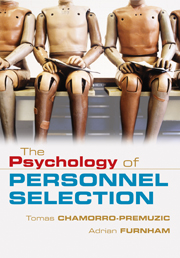Book contents
- Frontmatter
- Contents
- List of boxes
- List of figures
- List of tables
- Prologue and acknowledgements
- Part 1 Methods of personnel selection
- 1 Early, unscientific methods
- 2 The interview
- 3 Letters of recommendation
- 4 Biodata
- 5 Situational judgement tests and GPA
- Part 2 Constructs for personnel selection
- References
- Index
2 - The interview
from Part 1 - Methods of personnel selection
Published online by Cambridge University Press: 05 June 2012
- Frontmatter
- Contents
- List of boxes
- List of figures
- List of tables
- Prologue and acknowledgements
- Part 1 Methods of personnel selection
- 1 Early, unscientific methods
- 2 The interview
- 3 Letters of recommendation
- 4 Biodata
- 5 Situational judgement tests and GPA
- Part 2 Constructs for personnel selection
- References
- Index
Summary
Introduction
It seems almost inconceivable that any form of selection task and decision is not informed by one, indeed many, job interviews. These have been used in selection for over two centuries (for example, the Royal Navy used job interviews as early as 1800). Whether it comes at the beginning or the end of the selection process, whether there are one or many interviewers at a time and whether it lasts a few minutes or several hours, the selection interview is thought as a crucial and central part of the process whereby the employer and employee can get a good sense of one another. People use the words ‘chemistry’, ‘fit’ and ‘feel’, all of which speak primarily to the intuitive nature of the process. Candidates expect interviews.
An interview candidate may have to sit before large panels of people eager to have a ‘good look’ at him or her or else go through a large number of sequential ‘one-to-ones’ from the often many stakeholders in the job. Interviews differ on many dimensions: how long they last, how many interviewers there are; how much they are pre-planned; what the real purpose of the interview is.
The very popularity and ubiquity of interviews has spawned a huge industry in interview training. It has also spawned a number of books for both interviewers and interviewees. Interviewers are ‘taught’ how to ask ‘killer questions’ that get ‘to the heart of the interviewee’.
- Type
- Chapter
- Information
- The Psychology of Personnel Selection , pp. 30 - 51Publisher: Cambridge University PressPrint publication year: 2010
- 5
- Cited by



